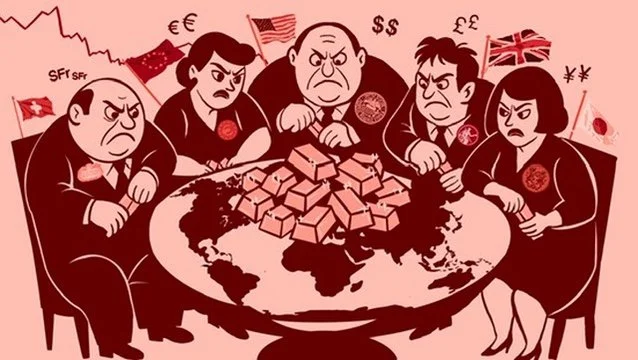Economics & Policy
Donald Trump’s second presidential term has been marked by slogans and spectacles. His self-proclaimed “Big, Beautiful Bill” (BBB) stands out not just for its name but its sweeping economic implications. The president is adamant about ”making America great again,” stating it would “make this country into a rocket ship. It's going to be really great.” But with beauty comes hefty price tags, which brings into question – how beautiful really is the big beautiful bill?
Housing has long been seen as the cornerstone of financial success in Canada, but has that belief gone too far? QBR Editor Jack Ayala examines how government policy, corporate strategy, and cultural values have turned real estate into Canada’s primary engine of wealth. From rising inequality and missed opportunities for innovation, this article explores how an overreliance on housing has reshaped the economy and put everyday Canadians at risk.
With increasing economic uncertainty and geopolitical tensions, central banks around the world, especially BRICS nations, are increasingly adding gold to their reserves. QBR Editor Janani Anandan explores how this movement extends beyond mere diversification, signalling a growing dissatisfaction with U.S. dollar dominance and embracement of de-dollarization practices. However, a complete return to a gold standard faces various obstacles including production constraints, market volatility and global scale complexities. Anandan investigates the motivations and implications of such a shift towards gold, offering insights to retail investors and policymakers alike.
Donald Trump’s second presidential term has been marked by slogans and spectacles. His self-proclaimed “Big, Beautiful Bill” (BBB) stands out not just for its name but its sweeping economic implications. The president is adamant about ”making America great again,” stating it would “make this country into a rocket ship. It's going to be really great.” But with beauty comes hefty price tags, which brings into question – how beautiful really is the big beautiful bill?
Housing has long been seen as the cornerstone of financial success in Canada, but has that belief gone too far? QBR Editor Jack Ayala examines how government policy, corporate strategy, and cultural values have turned real estate into Canada’s primary engine of wealth. From rising inequality and missed opportunities for innovation, this article explores how an overreliance on housing has reshaped the economy and put everyday Canadians at risk.
Liquidity shapes the valuation and pricing of nearly every asset - real estate, commodities, derivatives, credit to even public equities – liquidity is an important measure in calibrating an equilibrium price. Economics and Policy Editor, Rishab Chakraborty, explores an overview of the role of liquidity in each asset class, and explores many effective price discovery mechanisms and means of measurement. He delves into an overview of the conceptual regulatory, economic, and commercial barriers and promises of liquid markets.
In this editorial, QBR Economics & Policy Editor Tomas Serrano delves into the deep flaws within Canada’s Temporary Foreign Worker (TFW) Program, revealing how it has become a tool for exploitation under the guise of addressing labor shortages. Originally intended to fill gaps in the workforce, the program has been co-opted by firms seeking to cut costs, leaving foreign workers vulnerable to abuse and Canadian workers grappling with rising unemployment. Serrano examines the power imbalances, lack of protections, and systemic failures that have drawn comparisons to modern slavery. Despite recent reforms, the government’s efforts have fallen short of addressing the mistreatment of foreign workers and the broader economic implications. This article is a compelling call to action for meaningful change to uphold workers' rights and restore integrity to Canada’s labor market.
Drugs like Ozempic are revolutionizing society, with the potential to alleviate the $173 billion burden of obesity on the U.S. economy while reshaping workplace productivity and consumer spending. Senior Economics and Policy Editor Gefen Shpil examines the broader economic impacts of GLP-1 drugs, from their role in driving Denmark’s unprecedented growth through Novo Nordisk to the challenges of accessibility and corporate benefits policies. This article explores how this pharmaceutical breakthrough could redefine global health and economics, while cautioning against the risks of over-reliance on a single industry.
In this editorial, QBR Economics & Policy Editor Rishab Chakraborty discusses how information in the realm of financial services, markets, and intermediaries has traditionally been tightly regulated in a closed loop. This differs from traditional software, where consumer and behavioral data from non-financial institutions is typically unregulated in its use. However, with Open Banking reform coming to Canada’s regulatory data framework, we can see an uptick in innovation in the Canadian fintech space.
In this new article, QBR Sr. Advisor Joshua Cristofoli explores how SPACs are challenging the traditional IPO process, giving businesses a quicker route to the public markets and altering the financial landscape.
In a detailed guide to the recent changes to Canada’s capital gains inclusion rate as part of the 2024 Federal Budget, Senior Economics and Policy Editor Gefen Shpil outlines the impact such changes would have on individual investors, Canadian industries, and the economy. This article seeks to uncover just how many Canadians will be impacted by the changes and, most importantly, whether the Liberals are truly targeting the “ultra-rich”.
In this new article, QBR Editor Tomas Serrano investigates China's rapid advancement in the electric vehicle (EV) industry. The article explores how substantial government support and innovative manufacturing have positioned China as a leader in EV development, despite challenges in global market penetration due to high tariffs and ethical concerns. Serrano contrasts China's progress with the slower growth in Western markets, emphasizing the impact of political and infrastructural uncertainties. As the world shifts from gas-powered cars to EVs, this analysis provides insight into the future of sustainable transportation and the lessons the West can learn from China's approach.
Owen Milstone explores how piracy threatens entertainment industries by diverting revenue from legal sources. Despite high spending by companies like Netflix, rising costs and labor disputes worsen the issue. The tragedy of the commons applies, where individual benefit outweighs collective harm, leading to widespread piracy. It affects TV, movies, music, and sports, impacting artists and athletes.
In this editorial, Tomas Serrano dives into the push for universal basic income (UBI) as a solution to poverty and income inequality has gained traction globally, especially in light of job displacement from advancements in AI. In Canada, bill S-233 seeks to establish a national framework for UBI, inspired by historical experiments like Manitoba's MINCOME.
Despite concerns about abuse, inflation, and costs, supporters argue that UBI could provide a safety net, aid workforce reintegration amidst automation, and foster a society where individuals pursue passions.
Eric van Remmen discusses how Artificial Intelligence (AI) reshapes industries and job markets, drawing parallels with historical instances of creative destruction. It highlights the potential risks and societal impacts of AI's rapid advancement, emphasizing the need for proactive measures to address these challenges and ensure societal resilience.
In our final segment of our Geo Spotlight Series, QBR Editors Amin Nazari and Gefen Shpil engage in a thought-provoking debate on the shift towards right-wing economic policies under Javier Milei's leadership. In a first-of-its-kind ‘debate style’ format, the co-authors of this article propose two possible views regarding the possible outcomes of Mileli's fiscal policies. Shpil argues in favor, championing Milei's radical reforms as necessary 'shock therapy' to revitalize Argentina's floundering economy through deregulation, privatization, and dollarization. Contrarily, Nazari presents a cautionary perspective, questioning the precipitous and potentially perilous impacts of such drastic measures on Argentina's social fabric and economic stability. Their dynamic exchange sheds light on the complexities of Milei's policies, exploring the fine line between economic revival and societal upheaval. This article not only dissects the ideological battleground reshaping Argentina but also invites readers to consider the broader implications of such bold economic experimentation in a historically volatile region.
In our second segment of the Geo Spotlight Series, Philip Russ and Simon Ing explore the transformative impact of the oil industry on Latin America's economic giants. This thought-provoking article traces the journey from the early promise of wealth and progress to the challenges of the 'oil curse,' where abundance sometimes leads to economic downturns and corruption. The authors examine the shifting fortunes of Venezuela, Mexico, Guyana, and Brazil, revealing how geopolitical strategies, management practices, and international dynamics influence each country's path. Their analysis invites reflection on the future of energy, the potential for sustainable development, and the delicate balance between exploiting natural resources and fostering long-term national growth.
In our latest editorial and first segment of our GeoSpotlight series, QBR Editors Navroz Mehta and Tomas Serrano delve into the heart of the Lithium Triangle—spanning Bolivia, Argentina, and Chile—as a linchpin in the quest for sustainable energy. This insightful piece reveals lithium's pivotal role in the global green tech revolution, confronting the climate crisis with what's been termed 'white gold.' The authors navigate the geopolitical, economic, and environmental landscapes that frame lithium's pivotal extraction, its profound impact on indigenous communities, and the global energy paradigm. Through their analysis, Mehta and Serrano craft a compelling discussion on the journey towards a carbon-neutral future, underscoring the complex interplay of harvesting lithium to power the green revolution.
In our latest editorial, QBR Junior Editor Tomas Serrano dives into the heart of Toronto's soaring hockey ticket prices. As the festive season nears and the Leafs continue their on-ice magic, families across Toronto face a harsh reality: the dream of watching a game live is slipping away, priced out by tickets that seem to soar as high as the team's ambitions. Serrano explores this widening gap, questioning if the spirit of the game is being lost to commercial interests. As Leafs fans grapple with these skyrocketing costs, the article asks: Is attending a game now a luxury beyond the average fan's reach?
In our latest financial analysis, Eric van Remmen delves into the mounting government debt crisis, spotlighting the United States' fiscal challenges and their global implications. From historical debt management to current deficits and interest payments eating away at budgets, we scrutinize the intricate web of monetary policies and their potential impacts. The critical question remains: Can governments navigate this economic landscape without catastrophic consequences while addressing mounting debt and its ripple effects?
In this compelling editorial, QBR Senior Editor Morgan Farley probes the evolving priorities of young Canadians navigating career choices amidst economic uncertainties. Balancing the age-old lure of high earnings against the increasing value placed on well-being and job satisfaction.
In this insightful editorial, QBR Editor Eric van Remmen dissects Canada's intricate dance with inflation, labor dynamics, and economic policies. Navigating through strikes, stimulus-induced booms, and aggressive immigration pushes, he shines a light on the delicate balance the nation must maintain amidst post-pandemic tremors. With the Bank of Canada on a tightrope and inflationary pressures at the helm, this piece offers a deep dive into the multifaceted challenges and potential trajectories of the Canadian economy.
The four-day work week presents various benefits. However, many counties and companies still follow a five-day work week due to the worry of less output from employees, because of losing a whole day. But, from many experiments and studies, that theory has been deemed flawed. Even with evidence, is there a more in-depth reason why companies are not transitioning to a four-day week, or are they just falling behind in this fast-paced world?
Companies in Canada’s duopolistic and oligopolistic industries continue to grow stronger, signalling the need for intense government reforms. As seen in the aviation, banking, and telecommunications industries, outdated regulations harm Canadian consumers and entrepreneurs as they have an overwhelmingly negative impact on innovation and living costs.
Outdated terms may hinder Canadians’ ability to innovate in different industries, especially within the artistic, literary, and technological fields. Although measures may be taken to implement appropriate mechanisms to deal with the challenges resulting from the digital era, it is apparent that copyright is indeed being rendered obsolete.
In recent decades, activists and environmentalists alike have made great strides to raise climate awareness. However, the frequency of natural disasters is increasing, and the intensity of climate-related issues is becoming crystal clear. If nations do not work together to reduce global carbon emissions before 2030, the effects of climate change will be irreversible.
In recent months, the cost of fuel and oil have significantly risen to record-breaking heights. The staggering increase in the price of fuel—driven by several interconnected factors—has the potential to rewire economic, political, and social relations around the world.
Air travel has been going through a rollercoaster for the past few years, from blockbuster losses of $4.647 billion to major staff layoffs. Now with restrictions being lifted, the industry still has not received the relaxation it desperately needs, even with a significant amount of revenue coming in from bookings.
While price controls might seem effective from a macroeconomic perspective, such policy has significant consequences to Americans and citizens worldwide that outweigh the perceived benefit of increased affordability.
The North American cannabis industry is poised to become one of the fastest-growing and lucrative markets in our economy.
Canada’s economic recovery plan involving increasing interest rates is likely to create potential hurdles for consumers reaping the benefits of smaller interest payments.
UBI offers new hope to many Canadians amid struggling economic circumstances.































With increasing economic uncertainty and geopolitical tensions, central banks around the world, especially BRICS nations, are increasingly adding gold to their reserves. QBR Editor Janani Anandan explores how this movement extends beyond mere diversification, signalling a growing dissatisfaction with U.S. dollar dominance and embracement of de-dollarization practices. However, a complete return to a gold standard faces various obstacles including production constraints, market volatility and global scale complexities. Anandan investigates the motivations and implications of such a shift towards gold, offering insights to retail investors and policymakers alike.